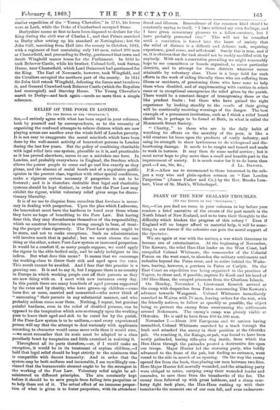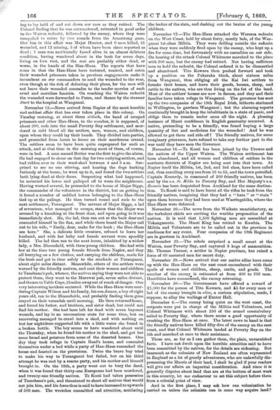DIARY OF THE NEW ZEALAND TROUBLES.
[TO THE EDITOR OF THE "SPECTATOR."]
SIR,—Can you find me room in your columns to lay before your readers a brief narrative of the events of the past month in the North Island of New Zealand, and so to turn their thoughts to the difficulty which hinders the progress of this colony ? Even if England will no longer afford us material help, it will be something in our favour if the colonists can gain the moral support of the Spectator.
We are again at war with the natives, a war which threatens to become one of extermination. At the beginning of November, Tito Kowaru, the rebel Han-Han leader on the West Coast, had compelled Colonel Whitmore, the commander of the Colonial Forces on the west coast, to abandon the military settlements and redoubts beyond the Patea river, and to retire behind the Waitotarn, leaving, however, a garrison in Patea or Carlyle. On the East Coast an expedition was being organized in the province of Napier, to chase and, if possible, capture Te Kooli and his band of 180 Han-Haus, the escaped prisoners from the Chatham Islands.
On Monday, November 1, Lieutenant Kenrick arrived at the camp with despatches from Patea announcing Tito Kowaru's advance towards Wanganui. Colonel Whitmore immediately marched to Wairoa with 70 men, leaving orders for the rest, with the friendly natives, to followas speedily as possible, the object being to prevent the enemy from overrunning the settlements around Nukumaru. The enemy's camp was plainly visible at Okutuku. He is said to have from 400 to 500 men.
November 7.—About 300 Europeans and 80 natives having assembled, Colonel Whitmore marched by a track through the bush and attacked the enemy in their position at the Okutuku pah. On reaching it, the Kainga, or pall, was found to have been newly palisaded, having rifle-pits dug inside, from which the Hau-Haus through the palisades poured a destructive fire upon our troops. Major Hunter led the storming party, who boldly advanced to the front of the pah, but finding no entrance, went round to the side in search of an opening. On the way the enemy opened fire from the bush, thus placing our men between two fires.
Here Major Hunter fell mortally wounded, and the attacking party
were obliged to retire, carrying away their wounded leader and comrades, to save them from the tomahawks of the foe. The
enemy then followed up with great boldness, and a sharp musketry fight took place, the Hau-Haus rushing up with their tomahawks the moment one of our men fell, and even endeavour ing to lay hold of and cut down our men as they retired. The Colonel finding that he was outnumbered, retreated in good order to the Wairoa redoubt, followed by the enemy, where they were compelled to retire by two rounds from the Armstrong guns. Our loss in this affair was Major Hunter, and 6 men killed, 21 wounded, and 12 missing, 3 of whom have been since reported as dead ; 1 man was accidentally found alive in an almost delirious condition, having wandered about in the bush for seven days, living on fern root, and the rest are probably either dead, or worse, in the hands of the Hau-Haus. The reports that have come in that the Hau-Haus have tortured, roasted, and eaten their wounded prisoners taken in previous engagements make it incumbent on our commanders to send the wounded to the rear, even though at the risk of defeating their plans, for the men will not leave their wounded comrades to the tender mercies of such cruel and merciless fanatics. On reaching the Wairoa redoubt the wounded were forwarded to Patea, and thence by the steamer Start to the hospital at Wanganui.
November 12.—News arrived from Napier of the most horrible and saddest affair that has ever taken place in this colony. On Tuesday morning, at about three o'clock, the band of escaped prisoners and other Hau-Haus, to the number, it is supposed, of about 200, rode into the small Poverty Bay settlement, and murdered in cold blood all the settlers, men, women, and children, upon whom they could lay their hands. They divided into parties, and proceeded from house to house on their murderous errand. The settlers seem to have been quite unprepared for such an attack, and at that time in the morning most of them, of course, were in bed. A man named Butter was the first to give the alarm. He had engaged to shear on that day for two outlying settlers, and had ridden over to their wool-shed between 4 and 5 a.m. Surprised to see no one stirring, and hearing the dogs barking furiously at the house, he went up to it, and found the two settlers both lying dead at their doors. Suspecting what had happened, he mounted his horse and galloped off to warn the neighbours. Having warned several, he proceeded to the house of Major Biggs, the commander of the volunteers in the district, but on getting to it found a number of saddled horses belonging to the Hau-Haus tied up at the palings. He then turned round and rode to the next settlement, Turanganui. The servant of Major Biggs, a lad of seventeen, who managed to escape, states that the Major was aroused by a knocking at the front door, and upon going to it was immediately shot. He, the lad, then ran out at the back door and concealed himself in the flax, and while there heard the Major call out to his wife, " Emily, dear, make for the bush ; the Hau-Haus are here." She, a delicate little creature, refused to leave her husband, and with her baby and female servant were speedily killed. The lad then ran to the next house, inhabited by a widow lady, a Mrs. Bloomfield, with three young children. She had with her at the time two young female friends from Napier, and they all hurrying on a few clothes, and carrying the children, made for the bush and got in time safely to the stockade at Turanganui, about eight miles distant. Meanwhile, others of the settlers were warned by the friendly natives, and sent their women and children to Tamihana's pah, whence, the natives saying they were not able to protect them, they went to the Murewai pah, seven miles distant, and thence to Table Cape, 25 miles away out of reach of danger. One very interesting incident occurred. While the Hau-Haus were murdering Captain Wilson and his family, his son James, a boy of eight years old, ran to the Bloomfields, and probably finding them gone stayed on their verandah until morning. He then returned home, and found his father, and brothers, and sister dead, but could not find his mother. She had been left for dead with seven bayonet wounds, and lay in an unconscious state for some time, but on recovering managed to crawl into a shed, and with nothing on but her nightdress supported life with a little water she found in a broken bottle. The boy seems to have wandered about until the Thursday, when he found his mother in the shed, and got her some bread and potatoes from some of the deserted houses. One day they took refuge in Captain Read's house, and concealed themselves under a bed while a party of Han-Haus ransacked the house and feasted on the provisions. Twice the brave boy tried to make his way to Turanganui but failed, but on his third attempt he was met by a rescue party, and his mother and himself brought in. On the 18th, a party went out to bury the dead, when it was found that thirty-one Europeans had been murdered, and twenty-one friendly natives. Te Kooti had taken possession of Tamehana's pah, and threatened to shoot all natives that would not join him, and his force thus is said to have increased to upwards of 500 men. The wretches committed sad atrocities, mutilating



































 Previous page
Previous page